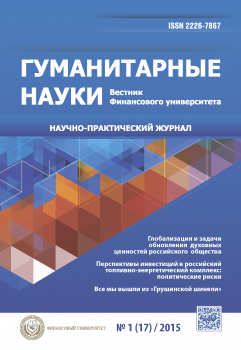The government as the central political institution and the subject of the rule of the society is to resolve key social issues, to set goals and to guide and support the social development. Political leadership plays the particular role and not only unites and guides people toward the shared objectives, but also provides as interlink between politics and managing the social matters. But a leader’s ability to lead the people, to pursue the public policy and to rule the society may face severe hurdles. One of these is inefficiency of public administration system as a result of underestimating both theoretically and practically, the actual complexity of the current society as the object to be governed and also due to such processes, as social self-organization, self-government and self-regulation. When the government and public administration fail to take into account the said processes and ignore the whole diversity of actual interests and goals of people who run public affairs, it could disorganize the public administration system, bureaucratize it and lead to mismatch different subsystems levels and processes in ruling over society. The government, being subject to the rule of society, should maintain efficient interaction with all the relevant social processes and mechanisms. Full realization of the social management nature, which manifests itself in voluntary subordination of all kinds and forms of human activities, has the power to connect all the ruling and self-ruling processes in the society. Essentially, the social management is conceived as a system, where lateral interaction between individuals, as actors, based on community of interests, can morph freely and consciously into hierarchic chain of command of objects and agents of management. Such transformation, given its paramount importance to the society, can be possible only provided that there exists the efficient institute of leadership, as the particular, specific yet appearing to be one of the main forms of ruling over the society. Genuine leadership is a visible manifestation of the very essence and significance of social management.
power, public administration, government, leadership, public self-government, politics, social management, ruling over society.
1. Lebedev P.N. Sotsial’noe upravlenie [Social management]. Leningrad, 1982. 255 p.
2. Kurashvili B.P. Ocherk teorii gosudarstvennogo upravleniya [Outline of the Theory of Public Administration]. Moscow, 1987. 294 p.
3. Smorgunov L.V. Setevoy podkhod k politike i upravleniyu [The network approach to politics and governance]. Politicheskie issledovaniya [Political researches]. 2001, I. 3, pp. 103-112.
4. Smorgunov L.V. Sravnitel’nyy analiz politiko-administrativnykh reform: ot novogo gosudarstvennogo menedzhmenta k kontseptsii «governance» [A comparative analysis of the political and administrative reforms from new public management to the concept of «governance»]. Politicheskie issledovaniya [Political researches]. Moscow, 2003, I. 4, pp.50-58.
5. Kupryashin G.L., Solov’ev A.I. Teoriya i mekhanizmy sovremennogo gosudarstvennogo upravleniya [AI Theory and mechanisms of modern governance]. Moscow, Moscow State University Press Publ, 2012. 642 pp.
6. Komarovskiy V.S. Smorgunov L.V. Politiko-administrativnoe upravlenie: Uchebnik [Political and administrative management: a tutorial]. Moscow, Publisher RAGS Publ., 2004. 496 p.
7. Smorgunov L.V. Gosudarstvennaya politika i upravlenie. V. 2 ch. Ch. 1. Kontseptsii i problemy gosudarstvennoy politiki i upravleniya [Public Policy and Management. At 2 pm. Part 1. Concepts and issues of public policy and management]. Moscow, Russian Political Encyclopedia (ROSSPEN). Publ., 2006. 384 p.





